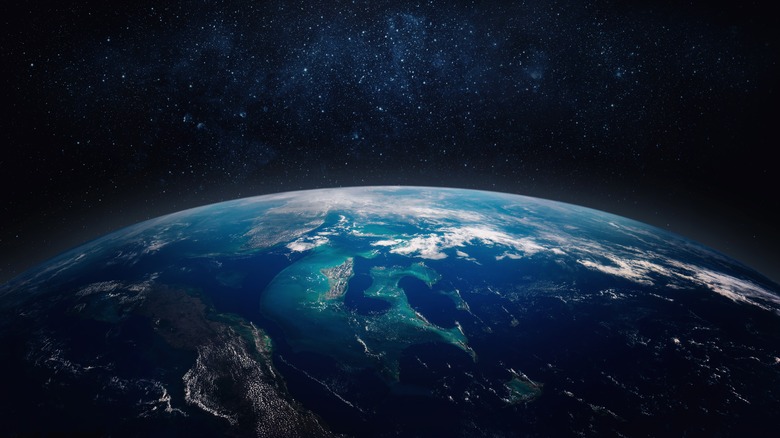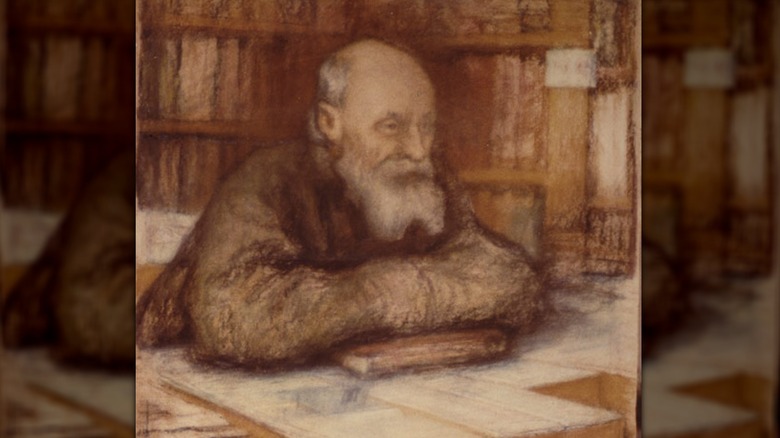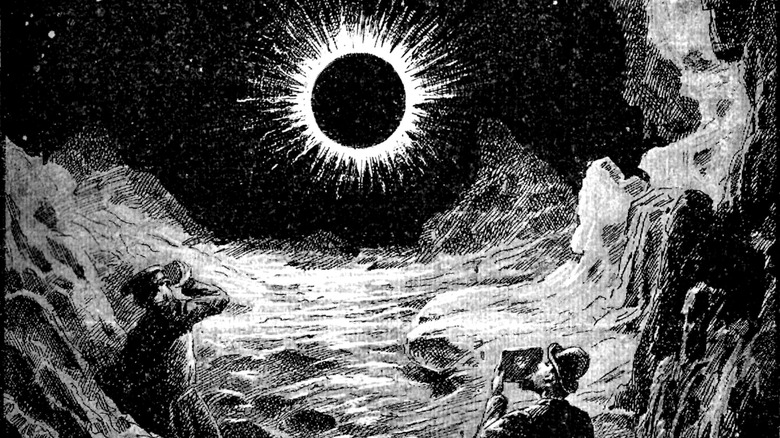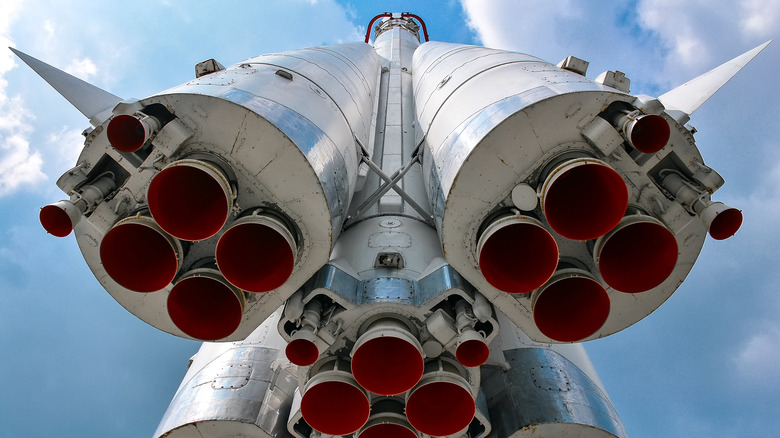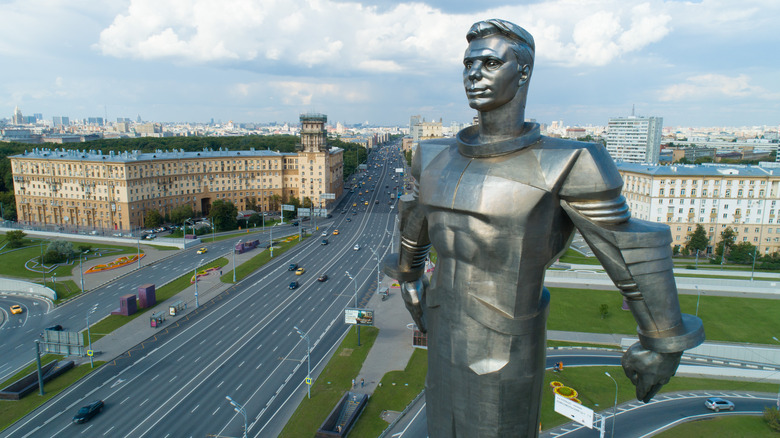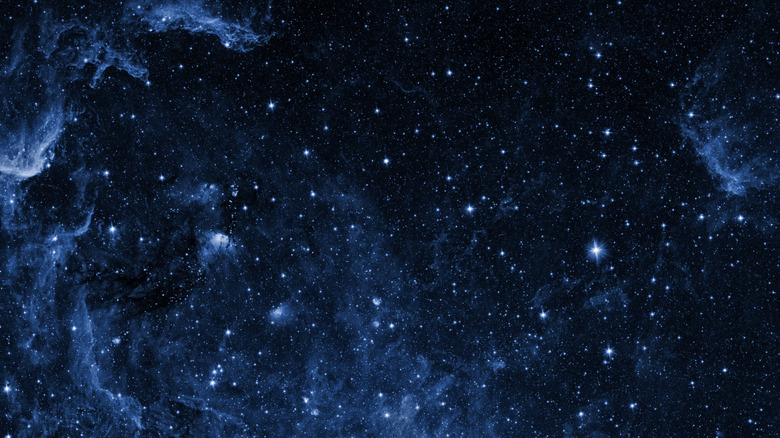What Is Russian Cosmism, The Soviet-Era Space-Age Spiritualist Movement?
"Our task is to make nature, the forces of nature, into an instrument of universal resuscitation and to become a union of immortal beings. The problem of God's transcendence or immanence will only be solved when humans in their togetherness become an instrument of universal resuscitation, when the divine word becomes our divine action." Such words are typical of 19th-century Russian philosopher and writer Nikolai Fyodorov, who almost single-handedly inspired not only legendary Russian writers like Leo Tolstoy and Fyodor Dostoevsky, but possibly the entire Russian cosmonaut space age in the 20th century.
Fyodorov's philosophy is difficult to condense into a short, manageable form. In fact, it wasn't until the 1970s — over 50 years after Fyodorov's posthumous writings got compiled into his "Philosophy of the Common Task" — that a cadre of Soviet thinkers dubbed Fyodorov's work "Russian Cosmism." Amongst these individuals, as The Conversation explains, was Alexey Savin, the future head of the Soviet psychic soldier program — just to illustrate what kind of individuals were attracted to Cosmism.
In a nutshell, Fyodorov and other Cosmists envisioned a future where humanity conquered death and lived forever, physically revived all of our dead ancestors, traveled the stars and colonized other planets, and eventually spiritually fused with God and the cosmos itself. In other words, Cosmism equals: "Orthodox Christian empire of Enlightenment Space Russians creating paradise through intergalactic colonization." By that definition alone, it might be easy to see why the Soviet space race owed Cosmism so much.
The unintentional father of Cosmism
When we say that Cosmism inspired the Soviet Union during its space race with the United States from 1955 to 1975, it's important to remember that the USSR nabbed a whole bunch of space firsts: Earth's first artificial satellite (Sputnik), the first non-human animal in space, the first man in space (Yuri Gagarin), the first woman in space (Valentina Tereshkova), the first space walk, the first probe on the moon, and the first rover on the moon. The driving force for these endeavors was not only a desire to outpace the U.S., but also a sense that a Soviet utopia would spread toward the heavens.
It was Nikolai Fyodorov who first put these sentiments into words, albeit unintentionally and way ahead of the cultural and technological curve. He was born in 1829 and died in 1903, 50 years before the space race and over 14 years before the 1917 Russian Revolution even turned Tsarist Russia into the USSR. Fyodorov was a wandering intellectual dubbed "the Socrates of Moscow." He cropped up in conversation with thinkers, writers, and artists, saying that humanity's pride and exploitation stripped the natural world and beat down its neighbors for the sake of luxury and comfort. He himself lived an austere life of eating bread and drinking water, and died in complete poverty. He also, despite such a grim assessment of humanity's selfishness, believed in its redemption through a kind of Orthodox Christianity-inspired vision of humanity reaching enlightenment amongst the stars.
[Featured image by via Wikimedia Commons | Cropped and scaled | CC BY 3.0]
Future ancestors amongst the stars
Nikolai Fyodorov never manufactured a cover-to-cover, synthesized doctrine, which makes Cosmism an after-the-fact creation of later people. Fyodorov didn't even compile his magnum opus "The Philosophy of the Common Task" himself. As the Internet Encyclopedia of Philosophy says, Fyodorov's "friends and followers" compiled it from 1906 to 1913 following his death using excerpts of his letters.
Yet, we can see glimmers of Soviet-era communist space-age ideology throughout Fyodorov's work, from an age that he envisioned but never saw. "Our [humanity's] disunity persists because there is no common task to unite men," he writes, continuing, "Regulation, the control of the blind force of nature, can and must become the great task common to us all." Later he decries "unbrotherly relations," which includes "all juridical and economic relations, class distinctions and international strife."
Still further Fyodorov steers toward immortality through science and its connection to creating God's promised paradise. He says, "Death transforms real presence into representation (memories). Therefore kinship demands the return of the deceased." He also declares Christianity to be a form of ancestor worship because God is a "Father," and says, "In the Divine Being [God] is revealed what humanity needs to become immortal." Shifting to space colonization he concludes, "The celestial worlds are the future homes of the ancestors, since the skies will be attainable only to the resurrected and the resurrecting. The exploration of outer space is only the preparation for these future dwelling places."
[Featured image by Alexander Emilevich Hoffman via Wikimedia Commons | Cropped and scaled]
Igniting the space race
As the BBC explains, Nikolai Fyodorov's philosophy and writing led directly to Sputnik 1, the world's first artificial satellite, and Vostok 1, the rocket that made Yuri Gagarin the first human to travel in space. In a three-generation, grandfather-to-father-to-son type of relationship, Fyodorov inspired Konstantin Tsiolkovsky, and Tsiolkovsky inspired Sergei Korolev, the USSR's chief rocket scientist who oversaw the design and construction of Sputnik and Vostok.
Tsiolkovsky was Fyodorov's direct student, and studied under him at Rumyantsev Museum near the Kremlin, where Fyodorov worked — so yes, even the impoverished "Socrates of Moscow" had a job. Taking more than a few cues from his teacher, Tsiolkovsky wrote in 1903, the year that Fyodorov died, "Mankind will not remain forever on Earth. The pursuit of light and space will lead him to penetrate the bounds of the atmosphere, at first timidly, then conquering the whole of solar system." Tsiolkovsky was chiefly a writer and stayed squirreled away from humanity in a log cabin.
We don't know many details, but Sergei Korolev apparently wound up visiting Tsiolkovsky in the reclusive writer's cabin when Korolev was young. "I left his house with just one thought," he wrote, "to build rockets and fly in them. From now on, I have one goal in life — to get to the stars." Lo and behold, this is exactly what he did. And he did so with Russian resources more limited than those in the West.
Immortal, space-dwelling Soviets
Russian Cosmism didn't just inspire the physical construction of Soviet rockets, but also what we might call the "spirit" of the age. Cosmism veers away from the philosophical and toward the mystical during, ironically, Soviet Russia. We say ironically because the Soviet Union was an atheist state. This was especially true under Joseph Stalin, the murderous dictator who ruled the USSR post-revolution from 1922 to 1953, when he died near the onset of the '50s space race. As History tells us, Stalin went on religious purges. In 1928, for instance, he launched his "Godless Five-Year Plan" that involved closing churches, taking their property, and putting an end to their educational and charitable activities.
But Nikolai Fyodorov, the father of Cosmism, was ardently Russian Orthodox Christian and rooted his beliefs in a "heaven in space, not on Earth" kind of Christian perfection. He also was anti-capitalist, and wrote in his "Philosophy of the Common Task" things like, "Profit-makers look upon nature as 'a storehouse from which to extract the wherewithal for a comfortable and enjoyable life, destroying and squandering nature's wealth accumulated over centuries'."
So, as the BBC says, Soviet Russia took Fyodorov's work, kept the anti-capitalist angle, dispensed with the religious stuff, and substituted for it a communist-style, egalitarian utopia of space-faring immortals living in "universal salvation." This is why Russian Cosmism, in sharp contrast with Western futurism, does away with man-fuses-with-machine transhumanism and grafts onto space civilizations the image of simple, agrarian, flesh-and-blood commune-dwellers.
Fusion with the noosphere
Things get really kooky when we wrap the "noosphere" into the mix, a science-meets-mysticism concept solidified by one of Nikolai Fyodorov's contemporaries, Vladimir Vernadsky. Vernadsky was a geochemist who split Earth's history into pre-human, post-human eras. We do the same nowadays when describing the current epoch as the Anthropocene, an epoch of time defined by humanity's enormous impact on the environment and natural selection.
Vernadsky believed that the human mind exists not in the geosphere or the biosphere, but in the "noosphere," a realm of space beyond the atmosphere that encompasses everything below it. Or as Human Energy says, "We envision a global human society that recognizes itself as a meaningful unity — a new kind of superorganism, or noosphere." While fundamentally a-religious, talk of the noosphere comes across as blatantly mystical. It also, per the BBC, meshes perfectly with Russian Cosmism. The transition from Earth to space to heaven to unity with God — a being that encompasses all of reality — happens as a part of one, entire process of spiritual and technological evolution via the noosphere. And so Cosmists, long removed from their Orthodox Russian founder, reach their final form: godhood.
And despite eschewing man-fuses-with-machine transhumanism, Cosmism when viewed through a modern lens sounds precisely like the liberation of the body through consciousness upload to an eternal cyberspace. In fact, such tech and other types of immortality technology like cryogenics are sometimes referred to as Fyodrovian, as are their followers.
